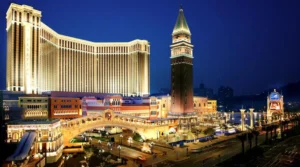A City in Transition
Coffee shop owner Daniel Chao was a first-grader in a completely different world when Portugal gave back Macao to China in 1999. Since then, his sleepy city has been turned into a thriving gambling destination with glistening casinos, and tourist buses have taken the place of peaceful streets. Despite its increasing affluence and reputation as the “Las Vegas of the East,” Macao has had difficulty achieving economic diversity, sustainable development, or civic engagement.
“What used to be a calm, unstructured area during my youth has turned into a busy, heavily marketed space,” Chao thought.
A Significant Anniversary
On Friday, Chinese President Xi Jinping will spend three days in Macao to commemorate the 25th anniversary of the city’s return to Chinese authority. Banners and other decorations line the streets, and next week there will be a fireworks show.
With a population of 687,000, Macao has transformed from a gambling enclave controlled by monopolies to the world’s largest gaming hotspot, attracting mainland Chinese tourists for the past 25 years. In comparison to countries like Denmark and Australia, its GDP per capita has increased to $68,000, exceeding Hong Kong’s $50,000.
An Expanding Yet Inequitable Economy
The only Chinese city where casino gambling is permitted is Macao, which is governed by the “one country, two systems” theory. Its economy is dominated by resorts run by subsidiaries of American gaming behemoths like MGM Resorts, Las Vegas Sands, and Wynn Resorts.
Despite economic downturns during the pandemic and government crackdowns on junkets catering to high-roller gamblers, Macao’s economy has expanded from $6.5 billion in 1999 to $46 billion in 2023 since liberalizing its casino market.
But there is a price for this prosperity. Chao remembers that although his mother’s job at the casino offered nicer accommodation and income, it also caused stress and unpredictable hours. After her night shift, he frequently completed his schoolwork by 5 a.m.. As a teacher, he observed how his students’ parents’ rigorous work schedules at the casino caused them to suffer with late nights and a need for tutors.
Despite its financial benefits, the tourism boom has resulted in a lack of creativity and adaptability. Chao and other locals claim that because businesses have had little motivation to expand their product offerings or enhance services, Macao has been left susceptible during difficult periods like the pandemic.
Political Shifts and Integration
Macao’s growing integration with Guangdong province is in line with national initiatives to advance Chinese medicine, tourism, technology, finance, and exhibits. By 2035, it is anticipated that 120,000 Macao residents will settle in a special zone on Hengqin Island in nearby Zhuhai.
Political constraints have become more stringent in tandem with economic integration. Beijing’s crackdown on dissent in Macao follows the 2019 anti-government protests in Hong Kong. In 2022, a national security law was strengthened, pro-democracy candidates were excluded from elections, and vigils honoring the 1989 Tiananmen Square crackdown were outlawed.
Jason Chao, a former activist, is among the critics who claim that civic engagement is discouraged. Chao, a democracy advocate, fled Macao in 2017 because he was fed up with local leaders and relied on Beijing to solve his problems. He currently serves as the director of a British civil society group.
Divergent Views Among Locals
Life has gotten better for a few senior citizens. The yearly cash distributions, which were started in 2008 and are financed by gaming tax reserves, are appreciated by retiree Ka Man Chun. Permanent residents received $1,240 this year. Avoiding politics makes Ka feel secure, and he claims that “25 years have passed, nothing really bad has happened.”
Despite complaints about Macao’s dependence on gaming, some, like Anna Ng, the proprietor of a flower store, see advancements in the city’s exhibition sector and cultural events.
However, the dearth of employment and recreational alternatives in Macao makes younger locals like Enid Ieong feel constrained. Ieong, who dreams of living in Sai Kung, a place renowned for its beaches and natural beauty, intends to move to Hong Kong to live with her partner. She sees the financial assistance as only making up for the “psychological damage” that comes with residing in a gaming hotspot.
She said, “I feel like I was born in a grand mansion, but all I do is sweep the floor.”

The latest news and breaking news today : bravenewclimate
Source : apnews






.png)





